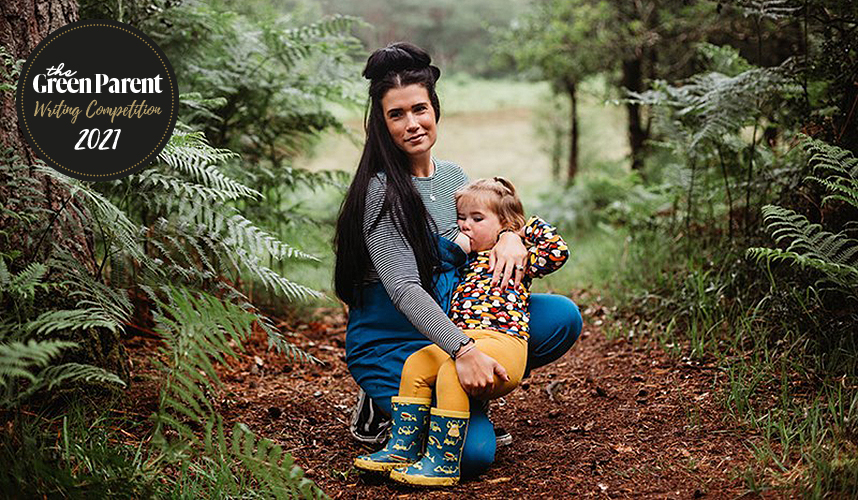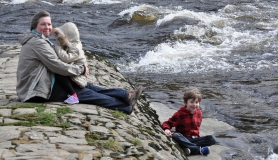When I became a mother, in the late-arriving autumn of 2011, I planned to breastfeed for around a year. This was the roughly the time that my own mother had breastfed my brother and I for – myself a couple of months less than that, him a few months more. It was twice the length of time that everyone talked about breastfeeding benefiting the baby for. I planned to go back to doing some part-time work just before the baby’s first birthday and he would, of course, be sleeping it his own room from around 6 months. After all, I’d been told that when a baby is fed beyond about 12-18 months then, well, it’s really “for the mother’s benefit; because she can’t let go”.
Like with many assumptions, plans and expectations I had held – or fallen into – along the beautiful journey of parenthood, things changed in reality. My breastfeeding relationship with my eldest lasted until he was four. With his brother, until he was five and a half.
A Smooth Start to Breastfeeding
Although my first child’s birth had been difficult, breastfeeding started smoothly for us. He latched on at a few minutes old, our gazes brimming with the wonder of just meeting yet knowing each other his whole existence. Staff helped me to support my body with pillows, holding him skin to skin, encouraging me that breastfeeding him would help my emergency C-section scar to heal. He fed and fed and, whether those huge blue eyes were open or closed sleeping, his dad and I couldn’t stop looking at him.
Those first few days, all I wanted to do was hold my son close to my body whether he was feeding - as he often was - or not. However, eventually the monotony and physical exhaustion of this started to take its toll and I started to feel frustrated at being glued to the sofa, tearful and brain-fogged. We had worked with a doula and I decided to try co-sleeping after listening to her talk about her experiences of doing so with her daughter. The change was instant: my son woke less and therefore I did too, feeling so much less like a zombie by day. I enjoyed having him close against me – it just felt right. We carried on co-sleeping with him for more than four years.
Those hours on the sofa sometimes felt endless but they did provide ample opportunity to inform my parenting journey and “find my village” of like-minded parents through natural parenting magazines, books, email groups, blogs and other online resources. In time I also found the in-person community that I felt at home in, too. It meant travelling a little further, but doing so was worth it to access a La Leche League group, a babywearing meet and alternative education groups where values among other aspects of our lifestyles and our parenting choices often overlapped.
Then, when my eldest was around three months old, we went through another challenging time with feeding. I wasn’t finding my local health visitors to be that supportive, so one night phoned a breastfeeding helpline. I spoke to a lovely counsellor who listened patiently, reassured me and made some gentle suggestions that turned out to be really helpful. The difficulties did pass; it might have felt like forever at the time, but now feels like it was just a moment. In times like these I remind myself of a little phrase I once heard: that “the days can be long, but the years go fast”. It helps me to notice the good stuff and the golden times too, because there always are those even on the days when it feels like I’m swimming in treacle. I remind myself that the kids only get one childhood, and I only get to share it with them once.
Both my sons would have long feeds as babies, as toddlers and into the preschooler years. It could be hard then to shake off the social expectations that they “should” be winding down breastfeeding by now – and the expectations I tended to put upon myself about how much I should be getting done and how family life should look. A book lent to me by my La Leche League group leader, “Mothering your Nursing Toddler”, by Norma Jane Bumgarner, helped reassure me, and taught me more about how extended breastfeeding benefits the child and the breastfeeding parent, and is completely normal in other cultures around the world.
Breast-feeding and Self-Care
I also started to enjoy breastfeeding more when I used feeds as an opportunity for some “me time”. I would grab a book and a drink, put my feet up and cherish the interlude from the frequent demands, chatter and risk management that life with a toddler necessitates. Both my children were early in dropping their naps, so these rest times felt important for both of us. Breastfeeding could reconnect, comfort and reconcile when my children did not yet have the language capacity to communicate their feelings or comprehend mine. Likewise, if they were ill, breastfeeding reassured me that they were getting fluids, comfort and nutrition during a time when they weren’t really up for doing much else. My eldest was quite prone to fevers; at an age where he couldn’t understand about keeping fluids up to avoid dehydration, and would push his cup away, I felt grateful to still be nursing him.
We were still breastfeeding when my periods returned and, for the couple of days leading up to, and couple of days following, the first day of bleeding, I would feel sharp pain in my breasts at the start of each feed. Unsurprisingly, I felt quite a strong aversion to nursing at this time. It helped me deal with this if I reminded myself that breastfeeding was my choice, to check in with myself on whether I wanted to continue. The answer was ultimately always yes and I felt empowered by affirming that I was choosing this, rather than seeing myself as a victim of the pain. The pain itself would last for a few seconds after he latched on and I found breathing techniques like those I had used when in labour to be helpful for riding it out. I would try to focus on other physical sensations: my son’s body against mine, the feel of whatever I was sat or lying on, to rub fabric from clothes or a blanket between my fingers – and remind myself that the pain would be over in seconds.
Society Expectations
However, a few months after my son turned three, the doubts and the shoulds around our breastfeeding relationship resurfaced and I started trying to get him to stop. Even in the things I had read around those who went with extended breastfeeding, the child seemed to quite naturally stop around age three. My boy was showing no sign of that, even though I felt ready, so I thought maybe it was just naive to expect readiness to just arrive: perhaps I needed to take charge and facilitate it. Besides, I found myself feeling embarrassed about nusing in public a child who was signigficantly older than almost any other child seen nursing in public, a child who could shout “I want BOOBIE!”. My son just wasn’t ready to stop, though, and I wasn’t comfortable with continuing to put him through the distress that my efforts were clearly causing him. I reminded myself that it wasn’t his age that made our breastfeeding relationship abnormal, but our society’s expectations, so we carried on.
Eventually, we started having nights where he would go to sleep without nursing. We would lie together in his bed with a CD on and after a while he’d ask for mama milk. I’d tell him to wait a little longer, reassuring him I’d stay right beside him, and sometimes he would drift off soon after. If he asked again, I would nurse him. I was pregnant with his brother by this time, and it seemed he wasn’t so keen on the milk by now; people say that pregnancy hormones can cause the taste to change. The hours, then days, between feeds got more until his last feed, a month after his fourth birthday and around halfway through my pregnancy.
This Too Shall Pass
My second son had a more straightforward birth and a similarly easy start to breastfeeding, with less colic than his big brother had had. I was more confident second time around, and, when a tough time came along, I had a greater sense of perspective that it would probably be short in the grand scheme of things. It could be tricky when he was on a long feed and my eldest needed help wiping his bottom or with something else that really needed me to have two hands availble; if I felt I was having to choose between their needs. However, when my second was a chatty, active toddler I was again grateful for those long feeds when they gave me a bit of uninterrupted time to do something like a puzzle, craft activity or story session with his big brother.
I’m aware that I’ve been very lucky to have encountered few physical challenges to breastfeeding. Although nursing my second child was briefly affected by thrush and by a blocked duct, both of these thankfully cleared up with prompt treatment. Other mothers I’ve known have struggled with latching difficulties, tongue tie, milk flow or other physical challenges and that can be really hard, especially if professionals don’t spot or provide necessary help for them promptly. However, good support makes a difference to all parenting challenges and I’ve been fortunate to have received a lot of that, as well as to have had family, friends and a partner who have been respectful around my choices, and/or made similar ones themselves. I acknowledge my privilege in having that around me, as well as my privilege in other areas such as being able to be at home with my children during their early years – and in being of the same white middle-class demographic that most people attending the parenting groups that I was supported by were.
Getting Support
I believe that how you support yourself is incredibly important, too. I recognise that at times when I was feeling exhausted, resentful or just touched out by breastfeeding then asking for (or accepting offers of!) help could give some relief. Attending to some self-care, to my sleep and nutrition or to my need to do creative work could go a long way towards shifting those feelings.
I felt a little concerned about how the breastfeeding relationship with my second son would end. With no pregnancy hormones to change the milk’s taste, and him not liking audiobooks and lullaby CDs that much, how would we make that transition? His fourth birthday came, and he was nowhere near showing readiness to stop, whereas his brother at that age was having days between feeds. His fifth birthday came, but I still wanted to trust in taking things at his pace. I didn’t know anyone else who had fed until beyond five, and there was perhaps some sense of isolation in that (especially as by now we were into the COVID-19 pandemic, and subsequent sense of isolation through lockdowns and restrictions).
The time did come, when the number of nights in a week when he went to sleep without nursing overtook the ones where he did. When the feeds got fewer and fewer, when they eventuallly stopped. When he was ready.







